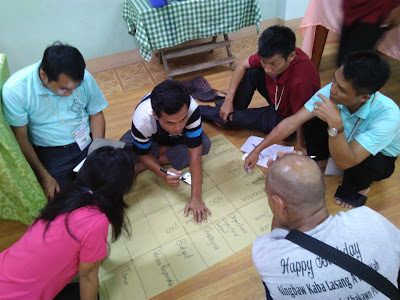The Young Adult Service Corps is giving me the opportunity to experience God in another part of his kingdom and build relationships. It has inspired my spiritual and personal growth. I am working alongside our brothers and sisters in the Anglican Communion to promote values of sharing, stewarding God’s creation, and economic development through the Episcopal Church in the Philippines.
Living in a different land, adhering to a new set of social norms, and existing within an unfamiliar system, I’ve encountered new opportunities to strengthen my virtues. When a jeepney leaves an hour past scheduled or electricity is out for two weeks after a typhoon, I have two options. One, I can stick to my default way of being—expecting everything immediately and according to plan. Or, two, going Filipino style—being patient and present together wherever you are, whomever you’re with.
As an American now serving as a missionary abroad, I’ve observed that each culture has unique ways of expressing their values. Experiencing new customs – through observation, being on the receiving end of interaction, or being encouraged to participate myself – I’ve embraced many of the values expressed in the Philippines.
[Are you a young adult Episcopalian ready to serve God and neighbor abroad? Visit the Young Adult Service Corps page to learn more about this amazing program.]
For example, Filipinos pride themselves on their warm hospitality which any visitor will surely experience first-hand upon entering a community. Passersby greet you warmly. Approaching any household, one is quickly invited for coffee and bread, and people take time to sit, talk and be together.
Having experienced this outward expression of inner grace and goodwill, and also having the opportunity to live this custom when visitors enter our office in the diocese, I am inspired to adopt the habit in the U.S. Often, we feel too busy to sit and have a conversation; in the Philippines, it is culturally mandatory! Moreover, this practice truly honors our blessing of fellowship. I will live out this souvenir of the Filipino way with those who cross my path in life going forward.
Having been inspired and given space to grow, I am energized to carry these lessons and values in my ventures beyond YASC. At times, I feel overwhelmed to share all my new experiences with those back home. If I just said it in words, I would spend all my time on writing letters! However, I’ve realized that the lasting treasure is what is being formed into my being. I will share these experiences by exemplifying the lessons in my daily life in due time. The instillation of these virtues is a blessing, and I look forward to living out the truths I’ve discovered here.
In turn, all have the capacity to grow from lessons learned in our walk of life. Spiritual growth is not static. Embrace values that new people and places can teach you. Incorporating these into our lives is a way of honoring our formative experiences as well as sharing the gifts from our path with loved ones.






